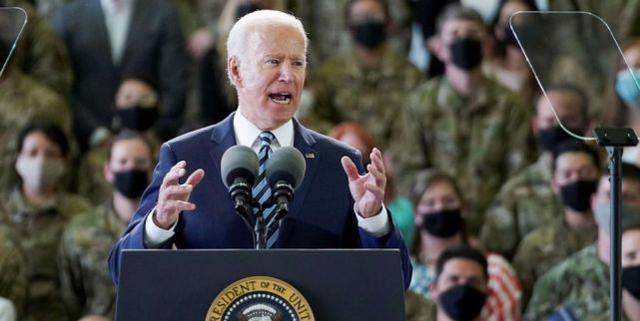"America is back" is the favorite mantra of American leaders, and it is also the most ridiculous American slogan that people hear.

It's like the bare-chested emperor wandering the streets saying that he is wearing a beautiful coat.
Do you say "the United States is back" every day, is it not a weak heart, afraid that the allies will underestimate the United States, afraid that competitors are not afraid of you?
In fact, during the Obama era, he said "return to the Asia-Pacific region", and Obama's vice president, now the PRESIDENT of the United States, as soon as he arrived in London, said "The United States is back", just like Xiang Lin's sister-in-law, nagging and not bothering. In fact, where has the United States left? Do you want to come back?
The whole world knows that the g7 is, which is to be bold before the old man meets Putin, but you lifted the sanctions on the Nord Stream-2 project, and the bottom card is all exposed.
To put it bluntly, Biden finally understood that Trump was right and wanted to win Russia over.
As a result, the whole world is paying attention to the new evolution of the sino-Russian-US triangular relationship. The author believes that historically, the United States has had a successful experience, that is, China and the United States have "broken the ice" and reached the "joint China and the Soviet Union" of the United States; it has also given China the opportunity to improve the external environment and reform and open up. Therefore, the great triangular relationship between China, Russia and the United States is a changing relationship, and the possibility of Russia falling to the United States cannot be ruled out. But, at least not in the Biden era. Why? Because Biden doesn't have as many cards as China. Putin's strategic, economic, and geopolitical benefits in China are far from what the elder Biden could have given.
Therefore, when Biden meets Putin this time, Russian-US relations will ease up, but the basic structure of the Sino-Russian-US triangular relationship will not change.
In their so-called "Global Threats Report" to Congress, U.S. intelligence claimed that one of the reasons China and Russia have been more united than at any time since the 1950s was U.S. sanctions. Therefore, Biden's abandonment of sanctions on the Nord Stream 2 project is an "olive branch" extended by the United States to Moscow. However, looking at the global strategic interests, looking at the respective interests of the United States and Russia, the little "Nord Stream 2" is full of teeth.
In fact, perhaps Putin will feel that the benefits of the two nuclear power plants recently built in cooperation with China are more important to Russia than nord stream 2. On May 19, Chinese President Xi Jinping and Russian President Vladimir Putin jointly cut the ribbon for the start of construction of China's Tianwan Nuclear Power Plant and Xudabao Nuclear Power Plant by video link. These two nuclear power plants have introduced Russian 3+ generation vver-1200 nuclear power units, which is currently the world's forefront nuclear power technology.
The first phase of Tianwan Nuclear Power is also the introduction of Russian technology, the base has driven the development of related industries between China and Russia, creating more than 20,000 jobs; delivering more than 270 billion kWh of clean energy electricity to the society, and the cumulative power generation can be used by more than 100 million Chinese households for 1 year, which is equivalent to reducing the combustion of standard coal by more than 82 million tons, and the equivalent emission reduction is equivalent to planting more than 85,000 hectares of forests, contributing to China's goal of achieving carbon peak and carbon neutrality.
Putin said at the groundbreaking ceremony: "It can be said that the current Russian-Chinese relations have reached the highest level in history. "Putin is well aware that China's future carbon peak will require dozens of such nuclear power plants. Moreover, China is also an important sales market for Russian oil and gas.
In fact, the author believes that what Lao Bai wants to leverage most is Sino-Russian nuclear cooperation. This, of course, is not only the peaceful use of nuclear energy, but more importantly, the "nuclear balance" in today's world. Usually, the United States and Russia have the ability to destroy each other, so they have reached a "nuclear terror balance" during the US-Soviet hegemony. The same is true today. Both the United States and Russia maximize nuclear deterrence, and instead of promising not to be the first to use nuclear weapons, they often threaten their opponents with nuclear strikes. China has consistently affirmed that it will not be the first to use nuclear weapons, but it will retain the capability of nuclear retaliation.
The International Campaign to Abolish Nuclear Weapons said in its 2020 annual report that the United States spent the most on nuclear weapons at $37.4 billion, followed by Russia at $8 billion, the United Kingdom at $6.2 billion, France at $5.7 billion and India at $2.48 billion. China itself has shown itself to be moderate. However, Sino-Russian nuclear cooperation is believed to be the most feared by the United States.
Biden also wants to be the boss, and he must have economic benefits that benefit other countries, which is better than shouting "America is back."